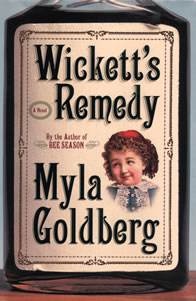|
Issue Contents :: Bookshelf :: Page [ 1 2 ]
Wickett’s Remedy
By Myla Goldberg ’93
Doubleday, 2005
Reviewed by Tim Tibbits
 Wickett’s Remedy, the second novel by Myla Goldberg, beautifully and heart-wrenchingly captures the pain, loss, and anxiety felt on the home front during World War I. As in her highly acclaimed Bee Season, recently adapted for the big screen, Goldberg’s second effort takes as its framework the coming of age of a young woman. Lydia Kilkenny is an Irish Catholic girl from working class South Boston, and although the confines of her childhood home and neighborhood comprise the too-small world she seeks to outgrow, the more oppressive context for her loss of innocence is the deadly Spanish Influenza epidemic sweeping the country in 1918. Wickett’s Remedy, the second novel by Myla Goldberg, beautifully and heart-wrenchingly captures the pain, loss, and anxiety felt on the home front during World War I. As in her highly acclaimed Bee Season, recently adapted for the big screen, Goldberg’s second effort takes as its framework the coming of age of a young woman. Lydia Kilkenny is an Irish Catholic girl from working class South Boston, and although the confines of her childhood home and neighborhood comprise the too-small world she seeks to outgrow, the more oppressive context for her loss of innocence is the deadly Spanish Influenza epidemic sweeping the country in 1918.
Lydia’s journey into the wider world unfolds according to the limited options of a girl of her class and generation: first as a shop girl selling shirts, then as a bride, then, as influenza ravages her community and nation, as a volunteer nurse. When courted by Henry Wickett, a medical student from a wealthy family, Lydia is as much taken with the wider world he represents as with Henry himself. Soon after their wedding, he tells his young bride that he’s quit medical school and that their fortune now depends on the success of Wickett’s Remedy. Like dozens of other palliatives of the era, the concoction has no more medicinal qualities than the soft drink it eventually becomes.
The domestic romance is cut tragically short when influenza claims Henry’s life. Mired in grief, Lydia one day takes a young neighbor to the hospital, where struck by the dire need for nurses, she volunteers as a nurse in an experiment that takes her far from home.
While Wickett’s Remedy encompasses a world of pain, even the most sorrowful moments are exquisitely rendered in Goldberg’s hands. Lydia observes the world—the delightful and the horrifying—with all of her senses, as seen in the passage when she returns to their apartment for the first time since Henry’s death:
It smelled the same. She had never attributed a particular smell to the flat before, but having been away from it she recognized it in an instant. It was cooking and clothes, bodies and housework; it was a compendium of little smells that embodied the scent of her and Henry. Standing inside the doorway, she inhaled the air in greedy draughts, trying to memorize the smell of her marriage before it disappeared.
In the margins, surrounding Lydia’s narrative, is a veritable Greek chorus of “whisperings” from the world beyond. Representing the collective memory of the deceased, they add details to which the reader would otherwise not be privy. Sometimes the effect is amusing, as when Lydia informs us that Henry’s “startled hands winged upward and upended his water glass,” while the margin note flatly states that “Henry remembers Lydia spilling the water.” All in all, Lydia’s story pulls the reader powerfully along, creating a world that while filled with great sadness, is fully satisfying to visit.
Tim Tibbits is a freelance writer in Cleveland Heights.
Next Page >>
|





